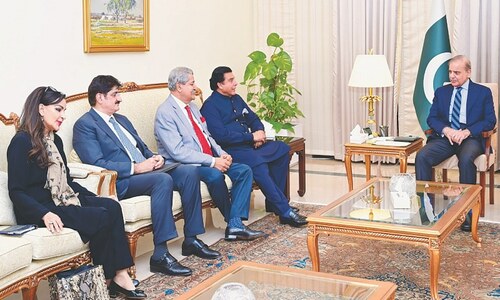KARACHI: “I went to an Urdu-medium school, did my Matric and didn’t go to college. I liked writing but there was no scope in Urdu journalism in those days. Then I taught myself English. The British Council library became my Oxford and Cambridge,” said senior journalist Ghazi Salahuddin during a panel discussion at a policy dialogue on ‘English Language in Pakistan Today’ with a focus on ‘class, the workplace and the shift in language use’ organised by the British Council at a local hotel here on Monday.
“I could do that at the time but can another young man do the same today? Not really. And this is because only if you know your first language well can you go on to a second language. But where is the first language today?” he asked.
“Students who haven’t had the luxury to attend an English-medium school, spend most of their time trying to gain fluency in English while not wanting to do the same in Urdu first,” he pointed out while giving the example of novelist Nadeem Aslam, who was recently awarded the prestigious 2014 Windham Campbell Literature Prize.
“Nadeem didn’t know a word of English until the age of 12. But he was able to learn English after that as he was well-grounded in Urdu.
“For some in Pakistan, English is not a second language and for others it is a completely alien language,” he added.
“Does Pakistan have a language policy?” Tony Jones, director programmes at the British Council, asked then.
It was said then that even though there was an education policy, there was no real language policy as such.
Prof Chris of the University of Birmingham was of the view that before coming up with a proper language policy there needed to be a discussion about it among all stakeholders. “Maybe you should also initiate some pilot programmes to move towards a language policy,” he said.
But Prof Anwar Ahmed Zai, chairman, Board of Intermediate Education Karachi, who was also present on the occasion, clarified that there was in fact a language policy followed by our education system. “English is compulsory from class one and Arabic is introduced from class three so that children are able to read the Quran. An additional language such as Sindhi is also introduced from class eight or nine,” he said. The policy dialogue also included round table discussions on ‘Whose English is it anyway’, ‘Exploring language in advertising’, ‘Critical thinking’, Embedding employability in higher education’ and ‘Would English still be as important as it is today if Pakistan was an innovative manufacturing base?’
Earlier, findings of a British Council research were shared and reviewed.
According to it, “Pakistan is a country, where English teaching is unevenly distributed and very much class-based. The existence of pseudo English-medium schools is rampant in Pakistani society. The urban-rural divide in the standard of English teaching is very wide. Things took a turn in the 1970s when English-medium schools came on the horizon and registration with Cambridge and Oxford O/A Levels was introduced. All the top examinations in the country such as Army recruitment exams, civil services exams, entrance and assessment examinations in all the professional organisations are conducted in English.”
Another quantitative research about what the teachers preferred as the mode of education was also read out, which showed that 75 per cent male teachers in public schools and 86pc male teachers in private schools wanted English to be the medium of instruction. Statistics also showed that 66pc teachers were convinced that bilingual practices were necessary in the classroom. Additionally, about half of female teachers surveyed and 44pc of male teachers in public and private schools of the country claim to use English very often as the medium of teaching in classroom. Also, 62pc of respondents from Madrassas agreed that English should be the medium of teaching in Madrassas in Pakistan.
In his address afterwards, writer and former senator and information minister Javed Jabbar said: “There is a mother tongue, a familiar tongue where Punjabi, Sindhi or Pakhtun persons may also understand a bit of Seraiki, Urdu the national language; Arabic which we may not understand but pray in five times a day and English. So we are a society functioning with five languages.”
British Deputy High Commissioner to Pakistan John A. Tucknott, meanwhile, observed that despite everything, “Pakistan still ranked higher in the use of English and its standard among all its other neighbouring countries.”










































Dear visitor, the comments section is undergoing an overhaul and will return soon.